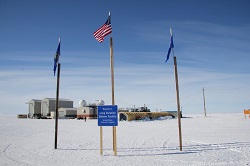De Provincie Gelderland zet € 195.000 in voor de opzet van een Smart Space Cluster, dat innovatieve producten ontwikkelt voor de ruimtevaart. In het cluster – waaraan SRON deelneemt – werken aerospacebedrijven samen met kennisinstellingen. De hoogwaardige technologie moet eveneens toepasbaar zijn in de gezondheidszorg, voeding- en maakindustrie. Gedeputeerde Michiel Scheffer: ‘Smart Industry is de …
Category: News items
Count down has started for balloon mission on Antarctica
Vandaag zijn twee SRON-onderzoekers aangekomen op Antarctica, waar ze een ballonmissie van de NASA voorbereiden. Half december tilt deze ballon infrarood-detectoren van SRON/TU Delft naar de stratosfeer, om daar vanaf de rand van de ruimte onderzoek te doen naar het ontstaan van sterren en planeten. Systems engineer Wouter Laauwen doet hier in blogs regelmatig verslag …
European research grant for exoplanet researchers
De exoplaneet-onderzoekers dr. Jean-Michel Desert (Universiteit van Amsterdam/SRON) en dr. Ir. Frans Snik (NOVA/Universiteit Leiden) krijgen een Starting Grant van de European Research Council (ERC). Deze prestigieuze beurs van 1,5 miljoen euro is bedoeld voor aanstormend wetenschappelijk talent om hun eerste onderzoeksgroep te vormen. Jean-Michel Desert (Universiteit van Amsterdam/SRON) gaat de komende jaren de verscheidenheid …
Black hole caught feasting on a star
A group of astronomers with SRON researchers have detected the last ‘cry’ from a star that passed too close to the central black hole of its host galaxy and was being destroyed and ‘swallowed’ – a phenomenon known as a tidal disruption event. The study, based on the observations of X-rays emitted by leftover material …
Heel Nederland kijkt weer sterren
Op woensdag 21 oktober om 21.25 uur zendt omroep MAX op NPO 1 weer het tv-programma Heel Nederland Kijkt Sterren uit. Live vanuit de Oude Sterrewacht in Leiden nemen Jeroen Latijnhouwers en Govert Schilling de kijker mee op een bijzondere ruimtereis tussen hemel en aarde. SRON sponsort dit programma. Naar aanleiding van het succes van …
Herschel-HIFI probes skin of Orion
The Herschel Space Observatory has revolutionised our understanding of what star forming clouds look like. Photometric images of the dust emission, obtained at far-infrared wavelengths, have revealed spectacular networks of filamentary structures where stars are born. Those newborn massive stars (more massive than 8 solar masses) release large quantities of energy as ionizing UV radiation and …
Good vibes at Open Days
De Open Dagen van SRON op zondag 4 oktober waren dit jaar weer een groot succes. Meer dan 1100 mensen bezochten de programma’s in Utrecht en Groningen, waar jong en oud konden kennismaken met het ruimteonderzoek. Opvallend was het grote aantal kleine kinderen, wat voor een gezellige drukte zorgde in beide vestigingen. In Groningen, waar …
European citizens measure air pollution with their smartphones
Van 1 september tot en met 15 oktober 2015 gaan mensen in heel Europa met hun mobieltje fijnstof meten. De meetcampagne is bedacht door de mensen achter het succesvolle Nederlandse iSPEX-project uit 2013. De bevolking gaat in ieder geval de straat op in Athene, Barcelona, Belgrado, Berlijn, Kopenhagen, Londen, Manchester, Milaan en Rome. Het …
Toward a new picture of cosmic structure formation history
SRON astronomer Hiroki Akamatsu will receive a Veni grant from NWO (250 thousand euros) to establish a new picture of structure formation history. To achieve this Akamatsu will make use of observations with the Japanese space telescope Astro-H. He will also participate in the development of a novel imaging spectrometer for its big successor, the …
ARIEL mission to unravel exoplanet atmospheres
An ambitious European mission is being planned to answer fundamental questions about how planetary systems form and evolve. ARIEL will investigate the atmospheres of several hundreds planets orbiting distant stars. It is one of three candidate missions selected last month by the European Space Agency (ESA) for its next medium class science mission, due for …











